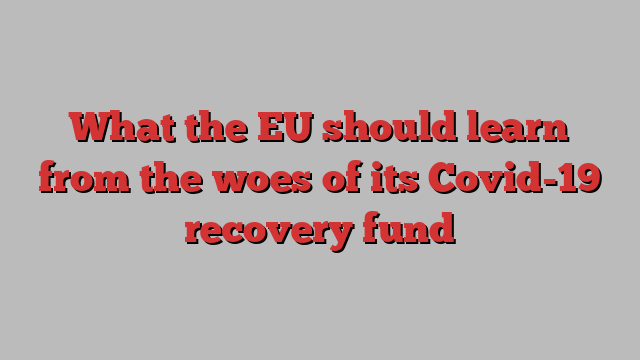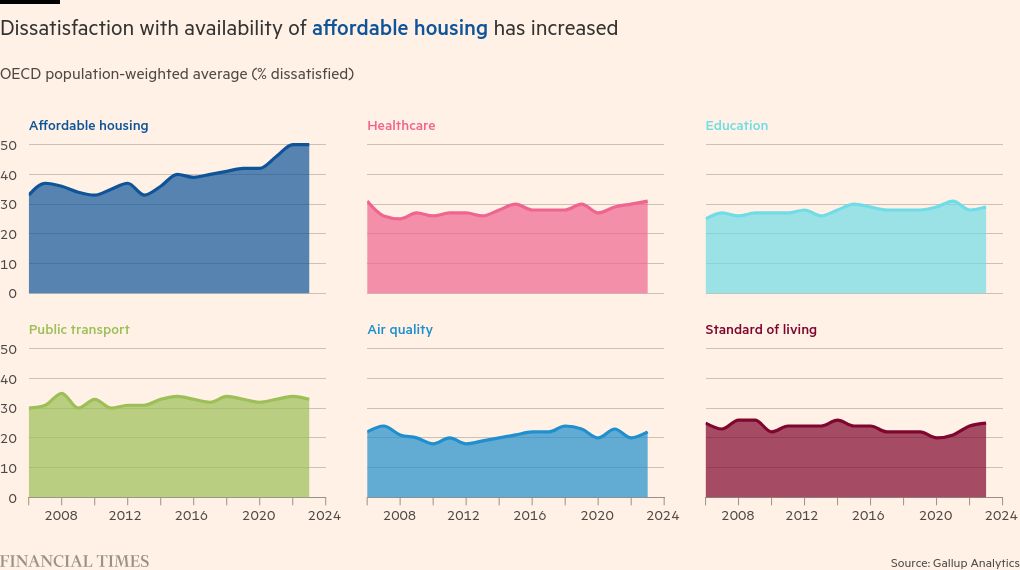
This article is an on-site version of our Europe Express newsletter. Premium subscribers can sign up here to get the newsletter delivered every weekday and Saturday morning. Standard subscribers can upgrade to Premium here, or explore all FT newsletters
Good morning. Belgium has nominated foreign minister Hadja Lahbib as its candidate to become a European commissioner, meaning all member states have made their choices for Ursula von der Leyen’s second commission. This means the allocation of portfolios — and subsequent parliamentary hearings — can begin soon.
Today, our economy correspondent parses the lessons from a concerning audit of the EU’s €800bn pandemic recovery fund, while our competition supremo previews a consequential legal ruling on Brussels’ extraterritorial powers to block mergers.
Follow the money
EU countries are lagging behind on reforms and investments linked to the bloc’s post-Covid recovery fund, the European Court of Auditors warned yesterday, meaning they are likely to miss an August 2026 deadline, writes Paola Tamma.
Context: The €800bn fund, which ties payouts to countries passing reforms and investing in digital and green infrastructure, is being touted as a blueprint for the next EU long-term budget.
But if member states risk missing the fund’s August 2026 deadline, this could spell trouble for the plan of European Commission president Ursula von der Leyen to make all budgetary funds conditional on economic reforms.
The auditors found that, on average, by the end of 2023 countries had requested only 70 per cent of funds for which they were eligible because of inflation upsetting their budget plans, bureaucratic hurdles, over-ambitious timelines and a failure to pass necessary reforms.
Six countries (Hungary, Poland, Belgium, Sweden, Cyprus and the Netherlands) requested less than half of the funds to which they were entitled.
Even more worrying is that, of the €213bn paid out by the end of 2023, only half has reached the “real economy” because projects had not been fully implemented. “[EU countries] get money for project design, but what we want to see is the end of the measure, that the project is completed and functioning,” said Ivana Maletić, the ECA member responsible for the audit.
By the end of 2023, the commission had disbursed 37 per cent of funds, while countries had met only 19 per cent of set objectives.
The situation is likely to become more difficult in the future, when countries have to fulfil more difficult targets for a smaller amount of money.
For instance, Italy — the fund’s largest beneficiary — will receive only 10 per cent of its allocated funds in 2026, but will have to deliver on more than 40 per cent of the objectives.
Maletić warns of a risk that “the incentive to do the final work at the end of the period is very low because the funding that remains to be given is very low”.
That’s why the ECA is calling for an extension beyond 2026. However, that’s politically a very hard sell, made harder by the fund’s underwhelming performance so far.
The commission said it was “working closely together with member states to support their timely and effective absorption of RRF funds”.
Chart du jour: Roof over your head

Expensive housing is at the forefront of worries for citizens in the world’s richest countries, soaring above healthcare and education.
Brussels’ long arm
The EU’s attempt to regulate mergers outside its territory will today be put to the test, with the European Court of Justice set to rule on whether regulators were right to stop biotech Illumina’s acquisition of Grail, a cancer screening start-up, writes Javier Espinoza.
Context: The European Commission blocked the $8bn takeover of Grail by the world’s largest gene-sequencing group two years ago, arguing it would hurt innovation. France and other member states referred the case to Brussels even though Grail has no revenues or presence on the continent, usually a legal requirement for deals to be scrutinised within the EU.
Regulators across the world have become increasingly worried about so-called killer acquisitions, by which a large company buys a smaller rival to stifle competition. Antitrust authorities worry that this leads eventually to less innovation, harms consumer choice and raises prices.
In its case, Illumina argued that the commission did not have jurisdiction to scrutinise the merger.
Last March, the ECJ’s advocate-general Nicholas Emiliou said the EU was wrong to block the deal. While his opinion is not legally binding, the court often follows the advocate general’s opinions.
Brussels has a lot to lose. On top of prohibiting the deal, it fined Illumina for closing the transaction without its blessing. Although Illumina has since sold its majority stake in Grail, a win for the biotech company would mean the fine would be dropped.
It would also set a precedent barring the EU from going after similar cases in the future.
What to watch today
Russian President Vladimir Putin visits Mongolia.
Claudia Buch and other senior European Central Bank officials speak at a banking supervisory event in Frankfurt.
Now read these
AfD’s options: Far-right Alternative for Germany has no viable path to power after winning regional elections, facing a choice between radicalism or influence.
Impunity: Russian President Vladimir Putin is in Mongolia, the first time he will have visited a country that could carry out his ICC arrest warrant — but probably won’t.
Streets ahead: With more than 1,300 outdoor works, Zürich’s astonishing public art scene is a treat for visitors.
Recommended newsletters for you
Trade Secrets — A must-read on the changing face of international trade and globalisation. Sign up here
Swamp Notes — Expert insight on the intersection of money and power in US politics. Sign up here
Are you enjoying Europe Express? Sign up here to have it delivered straight to your inbox every workday at 7am CET and on Saturdays at noon CET. Do tell us what you think, we love to hear from you: [email protected]. Keep up with the latest European stories @FT Europe

